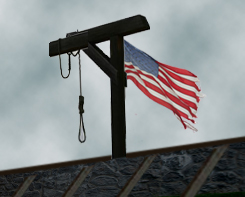Home / Death Penalty
Jose Medellin has been on Texas death row since he was 19. He is a Mexican National. A history of his case is here. TalkLeft background is here.
The U.S. Supreme Court today granted cert to hear his case.
The U.S. Supreme Court said on Monday it would decide whether President George W. Bush had the authority to direct a state court to comply with an international tribunal's ruling in the case of a Mexican on death row in Texas.
The justices agreed to review a decision by the Texas Court of Criminal Appeals that concluded Bush had exceeded his constitutional authority by intruding into the independent powers of the judiciary.
Medellin is one of the 50 foreign death row inmates whose cases were taken to the Hague where the World Court found their rights had been violated:
The World Court in The Hague in 2004 ordered the United States to review the cases of Medellin and 50 other Mexican death row inmates because U.S. officials failed to tell them of their right under the Vienna Convention to talk to consular officers immediately after their arrests.
Bush in 2005 decided to comply with the World Court's ruling and he directed state courts to review the 51 cases to determine whether the violation of their rights caused the defendants any harm at trial or at sentencing.
The Supreme Court today threw out three Texas death sentences.
The cases all stem from jury instructions that Texas hasn't used since 1991. Under those rules, courts have found that jurors were not allowed to give sufficient weight to factors that might cause them to impose a life sentence instead of death.
The cases were decided by a 5-4 majority, with Stephen Breyer, Ruth Bader Ginsburg, Anthony Kennedy, David Souter and John Paul Stevens voting to overturn the sentences.
Via How Appealing:
Lyle Denniston has this post at "SCOTUSblog." You can access the opinion in Smith v. Texas, No. 05-11304, here and the oral argument transcript here. Justice Anthony M. Kennedy issued the majority opinion in a case that divided the U.S. Supreme Court 5-4.
The Court today also issued decisions in two other death penalty cases that were orally argued together (access the transcript here): Abdul-Kabir v. Quarterman, No. 05-11284 (opinion here) and Brewer v. Quarterman, No. 05-11287 (opinion here).
(3 comments) Permalink :: Comments

A medical study out today casts new doubt on whether lethal injection causes the painless death we've all been told.
The study analyzed executions in two states, California and North Carolina. The findings:
We were able to analyze only a limited number of executions. However, our findings suggest that current lethal injection protocols may not reliably effect death through the mechanisms intended, indicating a failure of design and implementation. If thiopental and potassium chloride fail to cause anesthesia and cardiac arrest, potentially aware inmates could die through pancuronium-induced asphyxiation. Thus the conventional view of lethal injection leading to an invariably peaceful and painless death is questionable.
More...
(16 comments, 245 words in story) There's More :: Permalink :: Comments

Last week I wrote about California prison officials going behind the backs of legislators and authorizing and beginning construction of a new death chamber at San Quentin.
Friday, Gov. Arnold Schwarzenegger issued an order halting construction on the project.
Of course, it's not that Arnold is opposed to the death penalty. It's that he wants the project properly budgeted and submitted to the legislature.
Schwarzenegger, a Republican who supports the death penalty, will present a revised budget plan to the legislature next month that will serve as the framework for final budget talks.
But, the Judge who recently found California's execution procedures unconstitutional only gave the state until May 15 to come up with a new plan.
His concerns have put lethal injections in California on hold and threaten to end the procedure in a state that had 664 inmates on death row as of last week. A few have been awaiting execution since the late 1970s. San Quentin's cramped death chamber, built in 1938, was originally designed to gas prisoners.
Update: Law Prof Doug Berman at Sentencing Law and Policy contrasts Schwarzenegger with New York's Governor Eliot Sptizer, with praise for Spitzer.
(5 comments) Permalink :: Comments
In South Dakota's first death penalty case with a female defendant, a jury yesterday voted for life in prison without parole over a death sentence.
A jury on Wednesday spared the life of a woman who killed an acquaintance and hacked up her body with a chainsaw, sentencing her to life in prison without parole.
The victim's mother told the defendant's mother:
"We pray for you every day asking that God may touch your heart, that you may come to know his love and that you repent of your sins and seek God's forgiveness," she said.
Dee VanderGiesen told Wright's mother, Carolyn Tucker: "We both have lost our daughters. One to death and the other to prison time for as long as she lives. May God's grace be shown to you at this time of pain in your life."
The prosecution's facts:
More...
(7 comments, 558 words in story) There's More :: Permalink :: Comments

San Quentin prison houses 600 death row inmates, more than any other prison in the country. State legislators were surprised during a visit last month to learn that construction is almost complete on a new death chamber.
Staff members with the California Legislative Analyst's Office were made aware of the project to build a lethal injection chamber during a visit to the prison Tuesday, according to Dan Carson, director of the office's criminal justice section. The news spread Thursday to legislators after it was discussed at an oversight hearing for the state Department of Corrections and Rehabilitation's budget.
Legislative analyst staffers were "surprised" to learn the construction had started, Carson said, adding the project is "very far along."
The cost: $399,000. The figure is important because had it been $400,000., approval would have been required.
More...
(9 comments, 431 words in story) There's More :: Permalink :: Comments
Meet Marco Allen Chapman. Charged in Kentucky with murdering two children and leaving another child and their mother for dead, and facing a potential death penalty if convicted, he waived his right to a trial and pleaded guilty before the Court. He asked the Court to sentence him to death. The Judge complied.
His case is different from defendants who have waived appeals of death sentences. Chapman never had a trial.
His court appointed lawyers say this is state-assisted suicide. The Kentucky Supreme Court will hear oral arguments in the case Monday. All death penalty sentences are appealed automatically.
More...
(4 comments, 316 words in story) There's More :: Permalink :: Comments
The defendants are cousins and maximum security inmates at Florence who allegedly killed their cellmate, cut out his body organs and held them up to guards to taunt them — and to warn other inmates not to snitch them out. The aftermath of the murder was videotaped by guards.It would have been the first federal death verdict in Colorado since Timothy McVeigh. Sablan's lawyers initially went for an insanity defense. Then, as Alan Pendergast of Westword wrote on the day of the guilty verdict,
More...
(5 comments, 305 words in story) There's More :: Permalink :: Comments

Law Professor Doug Berman at Sentencing Law and Policy and Capital Defense Weekly believe there is a de facto policy underway by Bush and Alberto Gonzales to suspend federal executions. Prof. Berman writes:
Does the Bush Administration or some DOJ officials seriously question the constitutionality of its lethal injection protocol? If it doesn't, why agree to these stays? It is quite puzzling that the same administration and Justice Department that so steadfastly defends its procedures for GITMO detainees is not actively defending its procedures for executing convicted murderers.
(7 comments) Permalink :: Comments
Diane Rust-Tierney writes about Alberto Gonzales' attempt to politicize death penalty cases. Just another reason for him to go.
(27 comments) Permalink :: Comments


The Chicago Tribune has a great editorial today on why the death penalty should be abolished. The chief reasons:
- Arbitrary decisions as to whom it's applied
- Racial disparity in its application
- The increasing number of wrongfully convicted inmates, as revealed by DNA tests conducted after their trials
Who gets a sentence of life and who gets death is often a matter of random luck, of politics, of geography, even a matter of racism. Mistakes can occur at every level of the process.
More...
(10 comments, 459 words in story) There's More :: Permalink :: Comments
States that insist on using death as a sanction have a special obligation to assure that the punishment is administered fairly and that the innocent aren't sentenced to die. This editorial, authored by the ABA's president and the chairman of the Indiana Death Penalty Assessment Team, chastizes Indiana for failing to adopt procedures that assure accurate and just results in death penalty trials.
We in the ABA and the members of Indiana’s assessment team, agree that if the government is to take a life, it must first provide justice throughout every stage of the proceedings, including the trial, appeals, and clemency proceedings. Justice is not simply swift retribution — it requires accuracy, due process and fairness, and the opportunity to verify that each of those qualities was present at trial.Among other things, justice means that all DNA and other physical evidence must be preserved for as long as a death row inmate is incarcerated. As science advances, that evidence should be available for confirming testing. Currently, however, Indiana only requires preservation of biological evidence in limited circumstances.
(1 comment, 398 words in story) There's More :: Permalink :: Comments
| << Previous 12 | Next 12 >> |







